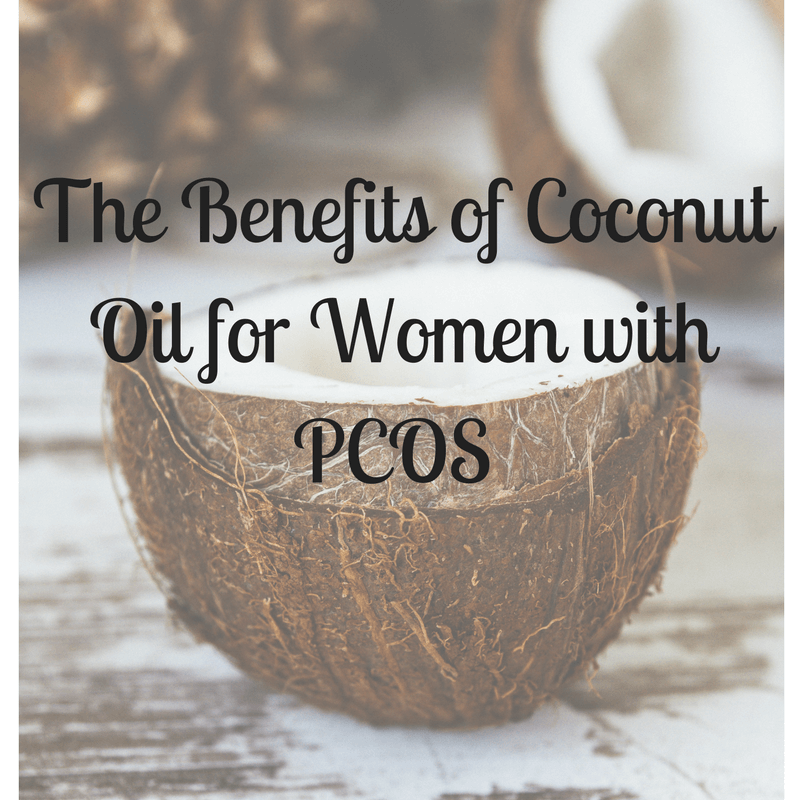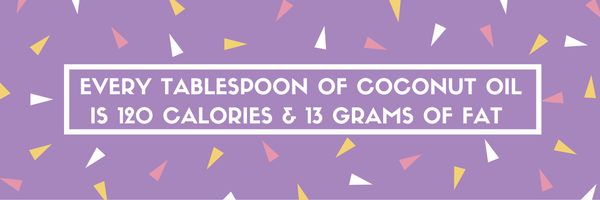The Nutritional Benefits of Coconut Oil for Women with PCOS
Did you know there are many nutritional benefits of coconut oil – especially for women with PCOS? In this blog, I discuss the nutritional benefits of coconut oil, what terms to look for when purchasing, as well as how to incorporate coconut oil into your current PCOS lifestyle. If that is not exciting – then I don’t know what is 🙂
It seems like no matter where you turn – social media, twitter, newspapers (yes, they do STILL exist!) or even your best friend – someone is talking about coconut oil. They may not know what they are talking about – but they are still talking!
Some folks say coconut oil is “bad” while other experts tout it as the next superfood. So what’s a girl with PCOS to do? Should you go out and buy jars of it? Or should you drop it like it’s hot and hope everyone stops talking this tropical oil?
Well fret not ‘cysta! The PCOS Dietitian is here to give you the 411 on coconut oil.
What the heck is Coconut oil?
To make coconut oil, manufacturers press the fat out from the white “meat” inside a coconut. Coconut oil consists mostly of saturated fatty acids. When most people think of the word “oil”, they think of a liquid fat like olive or avocado oil. However, due to its saturated nature, coconut oil it is actually solid at room temperature! If you have never seen it before, it actually looks pretty similar to shortening. However, thankfully it has none of the icky properties of that yucky oil!
Soooooooooo … I know what you are thinking. You just heard the nasty word saturated fat and you are officially in freak out mode. Hang in there ‘cysta I have some good news that is going to blow your mind.
The Super Hero of Coconut Oil – Medium Chain Triglycerides
Coconut oil’s saturated fats are primarily composed of medium chain triglycerides or more commonly known as MCTs. MCTs behave differently than other saturated fats in the body and because of this factor have a positive effect on many of the systems in the body.
Warning – it’s about to get nerdy! Skip this paragraph if you just want the ‘cliff’ notes version! MCTs get their name because of the length of their chemical structure. All types of fatty acids are made up of strings of connected carbon and hydrogen atoms. Fats are categorized by how many carbons they have: short-chain fats have fewer than six carbons, medium-chain fats have between 6–12 carbons and long-chain fats have between 13–21 carbons. Why do we even care about this nonsense you ask? Well because they are smaller, MCTs get into our cells easier and are quickly absorbed.
MCTs are powerhouses. They have soooooo … many benefits!
MCTs can help promote weight loss, decrease hunger, stabilize blood sugar and enhance immune and cognitive functions. Many studies also support MCT’s role in thyroid health. MCT oils have multiple benefits relating to cardiovascular health such as the ability to decrease total cholesterol as well as triglycerides.
What KIND of coconut oil should I buy?
Just like everything in the food industry today, some coconut oils are healthier than others. Two types of coconut oils exist – refined and unrefined. Can you can guess which one is the healthier of the two!?!
Refined Coconut Oil
Refined coconut oil is subjected to various chemical solvents, deodorizers and bleaches. In the refining process, coconut oil is exposed to high temperatures. Many of the refined coconut oils on the market also contain trans fats. Trans fats have a negative impact on heart health. Refined coconut oil is tasteless, odorless, and no surprise has a lower nutrient content. Avoid refined coconut oil like the plague.
Unrefined Coconut Oil
On the other hand, unrefined coconut oil aka virgin coconut oil, extra-virgin coconut oil or raw coconut oil is unadulterated. It is minimally processed which means it has a higher nutrient content. When you open up a jar of coconut oil – it smells like it should – like coconuts! If it is does not smell like coconuts, it is likely refined.
Additional terms to describe coconut oil
You may also hear the terms “expeller-pressed coconut oil” and “cold-pressed coconut oil.” Expeller-pressed coconut oil goes through a harsher process at a higher temperature which results in a loss of nutrients. Cold-pressed coconut oil is processed at a lower temperature and the greatest amount of nutrients are preserved.
Lastly, you want to see the term “organic” on the label as well. This guarantees that the oil is not produced through genetic engineering.
So, in short, look for the words organic, cold-pressed and unrefined when purchasing coconut oil.
Where can I buy coconut oil?
You can find coconut oil at most grocery stores, health food stores, and even some drug stores. In grocery stores you can find it in the natural foods aisle. I have also pleasantly seen coconut oil in stores like Costco, Trader Joe’s and even TjMax! Depending on the size, coconut oil can cost anywhere from $6.00 – $20.00 per jar. Make sure it is solid not liquid when you buy it. Keep it in cabinet to decrease its exposure to light or high temperatures. When the temperature is above 75 degrees – the coconut oil turns into an oil! So be careful.
How can coconut oil specifically help women with PCOS?
Unrefined, organic coconut oil has the potential to help women with PCOS in a variety of ways. Below are just a couple of the what I feel are the most important benefits.
Blood glucose levels. Many women with PCOS often experience unstable blood sugar levels. This can lead to dizziness, irritability, fatigue and increased hunger. Coconut oil can help stabilize blood sugar levels. Some studies have also demonstrated that coconut oil can also have a favorable impact on insulin secretion. Double win!
Improves blood lipid profile. The risk of getting heart disease increases when you have PCOS. Coconut oil can help raise levels of HDL (along with a consistent exercise program, of course!) or what we call our good cholesterol. It also can help reduce the level of fat (triglycerides) in the blood. (But be mindful it can also raise LDL cholesterol – or your lousy cholesterol – a number which you want low!) This is especially beneficial for women with PCOS ♥
Helps with hypothyroidism. While thyroid issues do not soley exist in this demographic, they can nonetheless be extremely problematic in women with PCOS. Coconut oil helps improve thyroid function and speeds up fat breakdown.
Weight maintenance. By nature of the syndrome, women with PCOS have an increasingly difficult time keeping the weight off. Since coconut oil is a source of fat, it can help you feel full and keep your weight at bay.
Summary of the key attributes of coconut oil for women with PCOS ♥♥♥
stabilizes blood glucose levels
Improves blood lipid profile
Helps with thyroid regulation
Promotes an ideal weight
Like with any type of fat, you always need to proceed with caution. Coconut oil is no exception to this rule. Every tablespoon of coconut oil is 120 calories and 13 grams of fat. These calories can add up pretty quickly! So while I sincerely believe there are some great benefits to coconut oil for women with PCOS I would urge you to use it in place (NOT in addition to!) of the fat you are using in your diet.
More so, it is important to be crystal clear that I am also not advocating coconut oil as your only source of dietary fat. The PCOS Dietitian ♥ variety! So please just throw it into the “mix” and expose yourself to all the different nutrients present in this oil. Start slow – only with about 1 teaspoon at a time. When consumed in large amounts too quickly coconut oil can cause diarrhea. And I don’t know anyone who enjoys diarrhea 🙂
Now, that you know all the benefits of coconut oil, here are some different uses:
Cooking or frying. You can use coconut oil as the base of the pan when cooking or frying your favorite dish. It is especially good in a stir-fry! Many of my patients even like it in scrambled in their eggs!
Baking. You can use coconut oil in recipes to make sure your baked good come out nice and flaky. Make sure to melt the coconut oil first! Then you can use it in its liquid state to replace vegetable oil and butter in recipes.
Smoothies. One of the things I often put on my patient’s meal plans are smoothies. I always like to include a source of fat into smoothies. I find that smoothies are much more satisfying with fat! While peanut butter is often my go-to choice for chocolate based smoothies, I prefer coconut oil for fruit-based ones. I recommend putting about 1 tablespoon in a small glass cup and putting it in the microwave for about 15 seconds. This will liquify the oil. Then you can add it directly into the blender when making your smoothie.
Coffee or Tea. Coconut oil can make a great addition to your coffee or tea in the morning. We refer to this drink as bullet proof coffee. I know it sounds crazy but just try it! It makes the coffee super-duper creamy. Yum!
And … when in doubt – eat it by the spoonful.

There is no shame in taking a good ol’ spoonful of coconut oil. I guarantee it will make you smile. Just like these happy little spoons 🙂
If you are not a big fan of cooking or baking, you can get the same benefit by eating one spoonful of coconut oil per day as you would by using it in your meals.
In addition, topical coconut oil has been shown to have a positive effect when rubbed consistently on thinning hair related to PCOS. While I am only familiar with the dietary aspects of coconut oil, it seems like this often pops up in my reading. So I felt like it was fair to throw that out at you especially if hair loss is something you struggle with.
So I hoped you learned a thing or two about coconut oil. When consumed in addition to other heart health fats like olive oil, grass fed butter, nuts and avocados – coconut oil has the potential to have a positive impact on PCOS symptoms. While I am by no means advocating it as a “cure” for ALL PCOS symptoms – it certainly has the potential to help with some of the major ones like dyslipidemia, hypoglycemia, elevated weight and hypothyroidism. So please give it a try – I am pretty sure you will enjoy it! And remember – always buy organic, virgin (or extra-virgin) cold-pressed if you can and skip the refined stuff!
Are you a coconut oil fanatic? Do you have some fun, exciting ways to incorporate this oil into your diet? Our community would love to hear your thoughts. Please let us know in the comments below how you using coconut oil.






